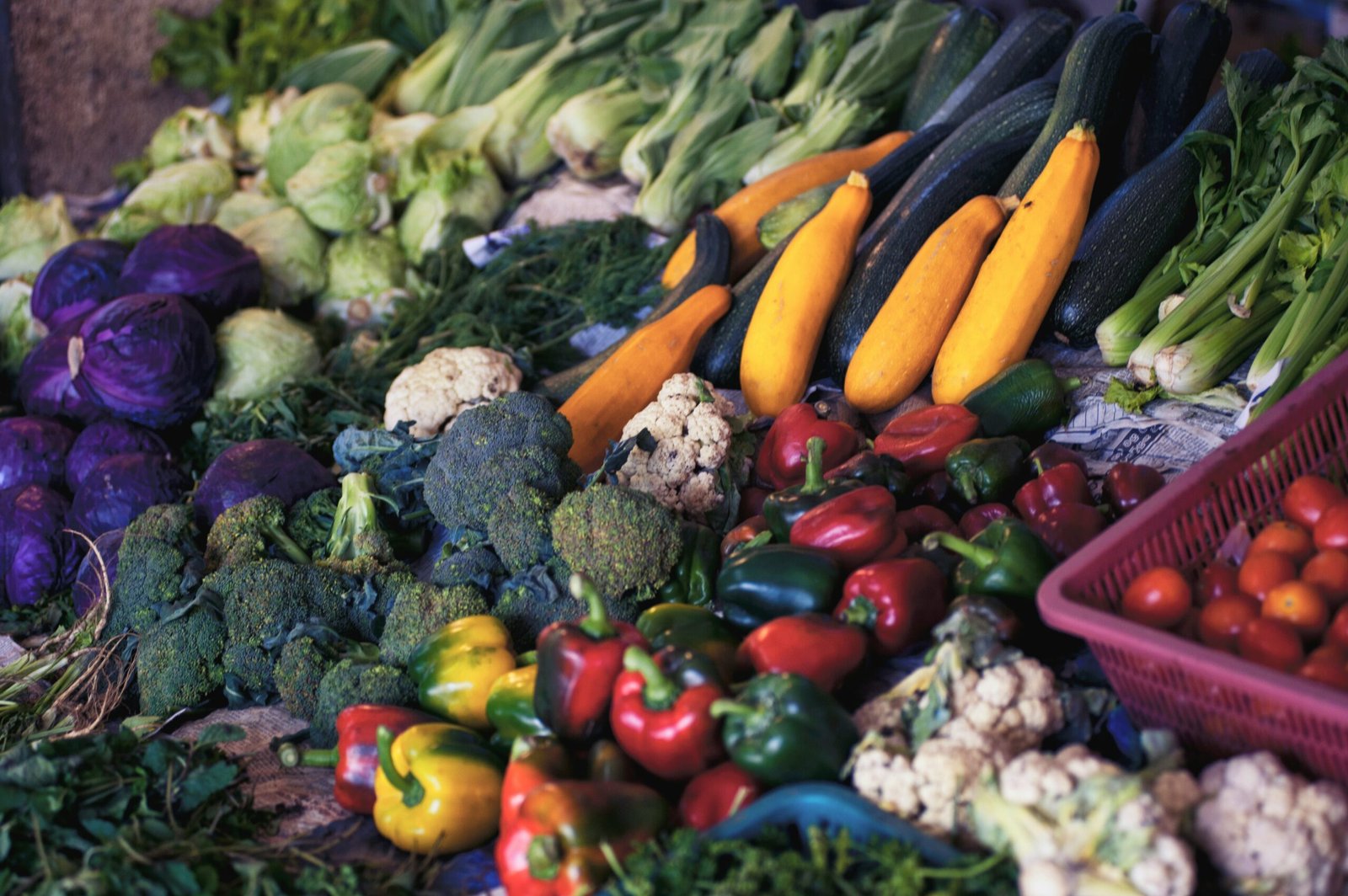Introduction to Weight Loss with Fruits and Vegetables
Weight loss can often seem like a daunting task, filled with numerous dietary restrictions and demands. However, incorporating fruits and vegetables into your daily meal plan offers an approachable and effective strategy for shedding extra pounds. These natural, whole foods stand out due to their low-calorie and high-nutrient profiles. Rich in essential vitamins, minerals, and dietary fiber, fruits and vegetables help create a feeling of fullness, making it easier to maintain a calorie deficit without feeling deprived.
One of the significant health benefits of weight loss with fruits and vegetables is their inherent ability to provide balance. Typically low in calories but high in nutrients, they facilitate weight reduction while ensuring that the body receives the vital nutrients needed for optimal functioning. For instance, leafy greens like spinach and kale are nutrient-dense yet incredibly low in calories, making them excellent choices for volume eating.
Moreover, fruits and vegetables are natural sources of antioxidants and phytonutrients, which play an essential role in maintaining overall health. Consuming a diet rich in these whole foods supports the body’s metabolism, enhances digestion, and aids in detoxification processes – all crucial aspects when aiming to lose weight. The fibrous nature of these foods also helps regulate blood sugar levels, reducing the risk of insulin spikes.
https://www.profitablecpmrate.com/bwpetv09?key=69b5a96f33cdcb357a96f9f869e3d7ad
Integrating a variety of colorful fruits and vegetables into your meals not only boosts nutritional intake but also adds flavor and texture to your diet, making adherence to a weight loss regime more sustainable. From crisp apples to sweet bell peppers, the diverse selection ensures that there are always enjoyable options to keep your diet varied and exciting. Ultimately, the myriad health benefits of incorporating fruits and vegetables into your diet underscore their indispensable role in a successful and balanced weight loss journey.
Nutrient Density and Satiety: Key Factors
Nutrient density refers to the ratio of nutrients to calories in a given food. Foods that are nutrient-dense provide a high amount of essential vitamins, minerals, and other nutrients with relatively few calories. Fruits and vegetables are exemplary in this regard, offering an abundance of vital nutrients while maintaining a low-calorie profile. This characteristic makes them indispensable for individuals aiming to achieve and sustain weight loss.
Fruits and vegetables are replete with vitamins such as vitamin C, folate, and vitamin A, alongside essential minerals like potassium and magnesium. These nutrients are crucial for maintaining bodily functions, supporting immune health, and promoting overall well-being during the weight loss journey. By incorporating a variety of fruits and vegetables into one’s diet, individuals can ensure they receive a broad spectrum of these essential nutrients, contributing to a balanced nutritional intake.
Satiety, or the feeling of fullness and satisfaction after eating, is another pivotal factor to consider in weight loss. Foods that induce higher levels of satiety can naturally lead to reduced caloric intake, which is beneficial for weight management. Fruits and vegetables are high in dietary fiber, a component known to enhance satiety. Fiber adds bulk to the diet, slowing down the digestive process and prolonging feelings of fullness. This can help individuals reduce overall calorie consumption by curbing the urge to overeat or snack frequently.
The fiber content in fruits such as apples, berries, and oranges, and vegetables like broccoli, carrots, and leafy greens not only aids in satiety but also supports digestive health. Proper digestion and a healthy gut are vital for efficient weight management and nutrient absorption. Therefore, the health benefits of weight loss with fruits and vegetables extend beyond mere calorie content, encompassing both nutrient density and satiety, which are key factors in fostering long-term health and wellness.
https://www.profitablecpmrate.com/nq7my1t66a?key=bb2d4ae95c421da5ae34a73884b95965
High Fiber Content and Digestive Health
The health benefits of weight loss with fruits and vegetables extend beyond calorie reduction. A primary advantage lies in their high fiber content, which plays a crucial role in digestive health. Fiber, a type of carbohydrate that the body cannot digest, significantly contributes to regular bowel movements, reducing the risk of constipation and promoting an overall well-functioning digestive system. The intake of high-fiber foods like fruits and vegetables helps maintain gut health by providing the bulk needed for stool formation, thus ensuring smoother transit through the intestines.
Furthermore, dietary fiber aids in reducing bloating, as it absorbs water and expands in the digestive tract. This expansion can contribute to a feeling of fullness, reducing overall food intake, which is particularly beneficial for individuals aiming to lose weight. Specific fruits and vegetables, such as apples, pears, and berries, are rich in soluble fiber, which dissolves in water and forms a gel-like substance, slowing digestion and aiding in stable blood sugar levels. Similarly, vegetables like broccoli, Brussels sprouts, and carrots are high in insoluble fiber, which helps add bulk to the stool and improves overall bowel movement regularity.
Integrating high-fiber fruits and vegetables into a weight loss plan offers dual benefits: enhancing digestive health and promoting weight reduction. Fiber slows down digestion, which can help curb appetite, leading to a decrease in caloric intake and supporting sustainable weight loss. For instance, a diet rich in fiber helps regulate hunger hormones, minimizing sudden spikes in appetite. Additionally, fiber-rich foods typically have a lower energy density, meaning they provide fewer calories for the same volume of food, allowing for a more substantial and satisfying meal without the excess calories.
In conclusion, incorporating a variety of high-fiber fruits and vegetables is an essential strategy for promoting digestive health and supporting weight loss efforts, making it easier to achieve and maintain a healthy weight while ensuring optimal digestive function.
Low Glycemic Index and Blood Sugar Control
The glycemic index (GI) is a measure that ranks foods based on how much they raise blood sugar levels after consumption. Low GI foods are those that score 55 or less on this scale and are digested and absorbed more slowly, resulting in gradual increases in blood sugar and insulin levels. Consuming fruits and vegetables with a low glycemic index is beneficial for maintaining stable blood sugar levels, which is crucial for effective weight management and overall health.
Stable blood sugar levels can help reduce hunger and food cravings, thereby making it easier to stick to a healthy diet. This is particularly important for individuals aiming for weight loss, as fluctuating blood sugar levels can lead to binge eating and poor food choices. Maintaining steady blood sugar levels also reduces the risk of developing type 2 diabetes and improves overall metabolic health.
Several fruits and vegetables are naturally low in glycemic index. Examples of low GI fruits include apples, pears, cherries, grapefruit, and berries. These fruits provide not only essential vitamins and minerals but also dietary fiber, which further aids in reducing the rate of sugar absorption. Among vegetables, options such as broccoli, cauliflower, spinach, kale, zucchini, and most leafy greens are excellent choices. These vegetables are also rich in antioxidants, which can help fight inflammation and support overall health.
Incorporating these low GI fruits and vegetables into your diet can contribute significantly to the health benefits of weight loss. By opting for foods that have a minimal impact on your blood sugar levels, you can achieve better control over your appetite and energy levels, making it easier to reach your weight loss goals. Additionally, the nutrient density of these foods supports optimal health, providing a strong foundation for long-term well-being.
Rich in Antioxidants and Phytochemicals
Fruits and vegetables are abundant sources of antioxidants and phytochemicals, compounds that play a pivotal role in maintaining and enhancing health. These bioactive substances contribute significantly to the health benefits of weight loss through their variety and potency. Antioxidants, such as vitamins C and E, flavonoids, and carotenoids, help neutralize harmful free radicals in the body. By reducing oxidative stress, these compounds boost the immune system, safeguard cellular health, and diminish the risk of chronic diseases.
In addition to antioxidants, fruits and vegetables are rich in phytochemicals like polyphenols, glucosinolates, and phytoestrogens. These compounds exhibit anti-inflammatory properties that aid in reducing systemic inflammation—a major contributing factor in obesity and related metabolic syndromes. By curbing inflammation, phytochemicals support healthier metabolic processes, thus promoting effective weight loss strategies.
The impact of antioxidants and phytochemicals extends further by enhancing overall metabolic functions. Improved metabolic rates mean that the body can more efficiently convert food into energy instead of storing it as fat. This not only supports weight loss but also sustains energy levels and promotes physical activity—an essential component of maintaining a healthy weight.
Moreover, the fiber content in fruits and vegetables aids digestion and ensures a feeling of fullness, which prevents overeating and helps control calorie intake. The diverse range of vitamins and minerals found in these plant-based foods further supports vital bodily functions and contributes to sustained weight management.
By integrating a diet rich in antioxidant and phytochemical-rich fruits and vegetables, individuals can harness the power of these natural compounds. This holistic approach not only addresses weight loss but also fortifies the body against various ailments, ensuring a healthier, more balanced life. The synergistic effects of these nutrients underscore the multifaceted health benefits of weight loss with fruits and vegetables.
Hydration and Its Role in Weight Loss
Hydration plays a pivotal role in the weight loss journey, often overshadowed by other factors such as diet and exercise. Adequate hydration helps to regulate body temperature, keeps joints lubricated, and aids in the effective transportation of nutrients and oxygen to cells. Dehydration, on the other hand, can lead to fatigue, dizziness, and a sense of sluggishness, which can impede physical activity, and consequently, weight loss.
Fruits and vegetables with high water content are particularly beneficial in meeting hydration needs while also contributing to weight loss. By incorporating these hydrating foods into your diet, you can stay adequately hydrated and feel fuller for longer periods, reducing the likelihood of overeating. Furthermore, these foods often possess fewer calories, making them ideal choices for a weight loss regimen.
Among fruits, watermelon stands out as a superb choice, boasting over 90% water content. This refreshing fruit is not only hydrating but also rich in vitamins A and C, which support overall health. Cucumbers, similarly, are composed of about 95% water and are excellent for hydration and maintaining a feeling of fullness without adding significant calories.
Strawberries and oranges are also prime examples of hydrating fruits. Strawberries contain about 91% water, and oranges hover around 87% water content. Both fruits are laden with essential nutrients such as vitamin C and antioxidants, which support overall well being while aiding in weight management.
Among vegetables, lettuce and celery are exceptional choices for maintaining hydration. Lettuce contains about 95% water and can be easily integrated into various meals. Celery also boasts a high water content of around 95% and provides dietary fiber, essential for digestive health and prolonging satiety.
By understanding the importance of hydration and incorporating water-rich fruits and vegetables into your diet, you can enhance your weight loss efforts effectively and healthily.
Practical Tips for Incorporating More Fruits and Vegetables
Increasing the intake of fruits and vegetables in daily meals is essential for experiencing the health benefits of weight loss with fruits and vegetables. One effective strategy is to begin each day with a nutrient-rich breakfast that includes fruits. Consider adding berries or a sliced banana to your morning cereal or oatmeal. Smoothies are another excellent option, as they can easily blend multiple servings of fruits and vegetables into a delicious and convenient drink.
For lunch and dinner, aim to make fruits and vegetables the centerpiece of your meals. Salads are a versatile option; you can enhance their nutritional value by including a variety of colorful vegetables such as bell peppers, cucumbers, and carrots. Additionally, incorporating fruits like apples or oranges can add a refreshing twist to traditional salad recipes. Consider vegetable-based soups or stir-fries as well, which can be bulked up with an assortment of vegetables and spices for added flavor.
Snacking on fruits and vegetables throughout the day can significantly increase your intake. Keep pre-cut vegetables such as carrot sticks, celery, and bell pepper slices readily available for quick and healthy snacks. Pairing them with a hummus or yogurt dip can make them even more appealing. For a sweet treat, opt for fruits like grapes, berries, or apple slices instead of sugary snacks.
Meal planning is crucial for ensuring a consistent intake of fruits and vegetables. Plan your weekly meals and include a variety of fruits and vegetables in your grocery list. Experiment with new recipes that feature fruits and vegetables as main ingredients. This not only adds variety to your diet but also helps maintain interest in healthy eating.
Overcoming common barriers such as time constraints or lack of cooking skills is also important. Quick and easy recipes that require minimal preparation can be a great solution. Furthermore, investing in kitchen tools like a good quality blender or food processor can make fruit and vegetable preparation more efficient.
By integrating these practical tips, you can embrace the numerous health benefits associated with weight loss through a diet rich in fruits and vegetables. Making small, consistent changes each day can lead to substantial improvements in overall health and well-being.
Case Studies and Real-Life Success Stories
Embracing a diet rich in fruits and vegetables has proven transformative for many individuals seeking to achieve their weight loss goals. One notable case is that of Sarah Thompson, a 34-year-old mother of two, who managed to lose 40 pounds in just six months by prioritizing fruits and vegetables over processed foods. Sarah’s approach involved integrating a wide variety of seasonal produce into her meals, ensuring her diet was both nutrient-dense and satisfying. Her success underscores the health benefits of weight loss with fruits and vegetables, driven by their low calorie and high fiber content, which helps in controlling appetite and reducing overall caloric intake.
Another compelling example is Paul Rodriguez, a 45-year-old office worker, who saw significant health improvements after incorporating a rainbow of fruits and vegetables into his daily diet. Paul started by replacing high-calorie snacks with fruits like apples and berries and including vegetables such as spinach and broccoli in his lunch and dinner. Over the span of a year, Paul lost 50 pounds, significantly reduced his cholesterol levels, and reported higher energy levels. His story emphasizes the versatility of fruits and vegetables in not just promoting weight loss but also enhancing overall health markers.
Laura Nguyen, a 29-year-old fitness enthusiast, turned to fruits and vegetables to break through a weight loss plateau. By switching her diet to include more greens, vibrant fruits, and root vegetables, Laura managed to lose the stubborn final 15 pounds while maintaining muscle mass. Her strategy included blending fruits into post-workout smoothies and crafting vegetable-centric meals that provided necessary nutrients without excess calories. Laura’s example highlights the effectiveness of natural foods in supporting long-term fitness and weight management goals.
These success stories demonstrate the diverse and powerful role of fruits and vegetables in weight loss. Whether used to curb cravings, boost nutritional intake, or enhance meal variety, they offer a sustainable and healthful approach to weight management that is adaptable to different lifestyles and preferences.
Conclusion: Embracing a Fruit and Vegetable-Rich Diet for Long-Term Health
The health benefits of weight loss with fruits and vegetables are manifold, extending beyond mere weight reduction to a substantial enhancement of overall health. Integrating an array of fruits and vegetables into one’s diet can effectively facilitate weight loss due to their high fiber content and low-calorie nature. These nutrient-rich foods help in maintaining a feeling of fullness, thereby reducing the likelihood of overeating and aiding in the management of body weight.
Beyond the immediate benefit of weight loss, a diet rich in fruits and vegetables also plays a pivotal role in preventing chronic diseases. The abundant presence of essential vitamins, minerals, and antioxidants in these foods contributes to an improved immune system, reduced inflammation, and better cardiovascular health. Regular consumption of fruits and vegetables has been linked to a lower risk of ailments such as heart disease, diabetes, and certain cancers.
Sustainable dietary changes, where fruits and vegetables take center stage, are crucial for long-term health maintenance. By adopting a balanced approach to eating that prioritizes these food groups, individuals can enjoy a diversified nutritional profile that supports bodily functions and promotes overall well-being. The versatility of fruits and vegetables allows for creativity and variety in meal planning, making healthy eating both enjoyable and accessible.
Ultimately, the pursuit of weight loss should not overshadow the broader goal of health improvement. A fruit and vegetable-rich diet represents a comprehensive strategy that addresses both dimensions simultaneously. Encouraging the adoption of such a diet stands as a testament to the transformative potential of these natural food sources. Embrace the benefits of fruits and vegetables, and pave the way for a healthier, more vibrant life.





